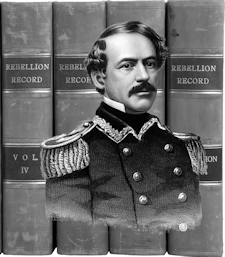January 17.—One hundred and fifty prisoners, released from the rebel government at Richmond, Va., arrived at Fortress Monroe. All of them were convalescents from the hospital. About twenty had crutches, and a dozen had to be carried on board, some on cots. All of them had been wounded. Dr. Higginbotham accompanied them, and the men were loud in commendation of his uniform kindness to them, and after cordially grasping his hand in taking leave of him, they gave him three enthusiastic cheers. They then saluted the old Stars and Stripes with a burst of enthusiasm that brought tears to the eyes, many waving their crutches above their heads. On the way back the wharves and embankments at Newport News were thronged with soldiers who greeted the released prisoners with tremendous cheers. The Cumberland and Congress, lying in the Roads, were also manned and gave a most enthusiastic greeting to the prisoners.
—This night, at Lynchburgh, Va., the Confederate flag, which had been flying from the yard of John O. L. Goggin, was forcibly torn down by some traitorous scoundrel, the flagstaff broken in two, and the cord by which the flag was hoisted cut up into small fragments. The flag itself was torn into tatters, and from its appearance, when found, would seem to indicate that the guilty party desired particularly to strip the stars from it, as not a vestige of any of them was left The act was a mean and despicable one, and proves conclusively that there is at least one Lincolnite in our midst, for no one, we feel sure, with one speck of Southern spirit could have been guilty of such an act—Lynchburgh Republican, January 18.
—The Burnside Expedition, which left Fortress Monroe on the 11th and 12th, arrived at Hatteras, N. C, having met with a severe storm and adverse winds.
—This day about four o’clock the steamer Connecticut spoke a small steamer off Juniper Inlet, on the Florida coast She promptly displayed a suspiciously new British ensign, which told the whole story—she had no name on her stern. She proved to be the Emma, (or, as some of the crew call her, the Onward, that being the name they shipped under,) that ran the blockade at Apalachicola in November last. She had been to Havana and taken a cargo of cotton and other stores, in value, according to the invoice found on board, twelve thousand dollars. The captain denied all knowledge of the intentions of the owners. He and the crew, he said, were shipped for St. John’s, N. B. Some correspondence was found, sufficient to condemn her; one paper was a telegraphic despatch stating the “blockade was open and the coast clear” at Apalachicola. This was at the time she slipped out. The Connecticut took possession of her as a prize.
—The Fortification Bill passed the United States House of Representatives to-day, appropriating an aggregate of five millions nine hundred and sixty thousand dollars. Among the appropriations were one hundred thousand dollars for Fort Knox, on Penobscot River; one hundred thousand dollars for fort on Hog Island, Port; land harbor; seventy-five thousand dollars for Fort Warren, and fifty thousand dollars for Fort Winthrop, Boston harbor; one hundred thousand dollars for the fort in New-Bedford harbor. The appropriation also included the following for the year 1862: fifty thousand dollars for Fort Knox; fifty thousand dollars for Hog Island Fort; fifty thousand dollars for Fort Winthrop and exterior batteries; fifty thousand dollars for fort at New-Bedford; fifty thousand dollars for Fort Adams, Newport.
—The Seventy – sixth Regiment New – York State Volunteers, under the command of Colonel Green, and two artillery companies, commanded by Captains von Puttakamer and Ellis, left Albany for the seat of war. They were reviewed in the Park by Governor Morgan, and addressed by Governor Pierce, of Ulstor, before their departure. They are a fine body of men, and number one thousand and three hundred strong.
—Navigation of the Mississippi River was entirely suspended at St. Louis in consequence of the gorging of the ice twenty miles below the city, extending to a point some distance from there, the ferry-boats not being able to run, and the ice not being sufficiently strong to bear heavy weights.
—A Flag of truce from Fortress Monroe to the rebels took to-day the following released prisoners: Colonel Pegram, Captain Sutton, Lieutenant A. C. Bell, Captain Tansill, Lieutenant John W. Pool, Lieutenant J. C. Lassell, Dr. R. W. Jeffreys and Captain L. J. Johnson.



